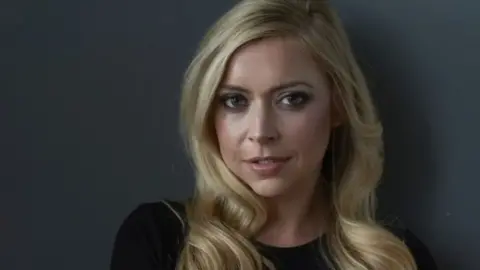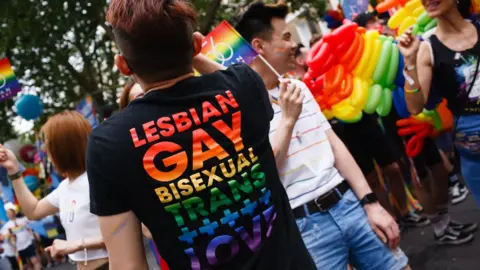The bisexuality dating dilemma
 Charlie Hopkinson
Charlie HopkinsonBisexual Visibility Day has been celebrated on 23 September for the last 20 years.
However, at a time of seemingly wider LGBT acceptance, is society actually accepting of the "B"?
Some people who identify as bisexual have told the BBC of issues they regularly come across when trying to live openly as bisexual individuals.
They have experienced abusive relationships, disrespect in the workplace, and discrimination on dating apps just because of their sexuality.
The Trades Union Congress has released a report highlighting that about one in five bisexual people (21%) reported they had been sexually assaulted at work.
'It scares me how people will react'
Matt is a graduate trainee living in Cambridge. He has struggled to maintain relationships with both men and women, and says he now has to lie about his sexuality in order to date people.
"It scares me how people will react," he says. "It feels like I have a dark secret that I haven't aired fully.
"One girl I was dating suddenly said that the thought of me being with a man made her physically sick. Then she blocked me on everything.
"When I date people, and mention I'm bisexual, the relationship ends. When I lie to people, and hide my sexuality, it lasts. I still don't know whether I should reveal it from the start, or wait, because the longer I wait the more anxious I get, but I don't want any relationship to end."
"I feel like if I end up in a straight relationship, I'll look like I was just experimenting all these years, but if I end up in a gay relationship people will say I was never actually bisexual. Then if I don't have a monogamous relationship people will say I'm just greedy."
Nichi Hodgson is a writer who lives in London. She says she came out "late" as bisexual at 26, and had trouble exploring who she was because of society's pressures to be either gay or straight.
"It's a wild ride because of people's misconceptions," she says. "People still can't get their heads around bisexuality.
"I would have to hide that I'm bisexual online. I would have a straight profile, and a gay profile, but having a bisexual one created serious problems. Some people think that bisexuality is kinky and code for BDSM. It's like you're up for anything. There's a real stigma.
"My ex-girlfriend used to joke that she'd have to bleach me before she could sleep with me because I'd been with guys before. I was really disturbed. It's deeply hurtful.
"I have heard people say that bisexual people don't get married - they just go straight and get married. There's a real social pressure to go straight rather than being bisexual."
 Getty Images
Getty ImagesIn the TUC survey - conducted by ICM Unlimited using a sample of 1,151 LGBT people in the UK - 30% of bisexual workers said they had experienced unwanted touching at work, for example hands being placed on their lower back or knee.
And 21% said they had experienced sexual assault, such as unwanted touching of the breasts, buttocks or genitals, or attempts to kiss them, and 11% said they had experiences sexual assault or rape while working.
TUC general secretary Frances O'Grady said the results reveal a "hidden epidemic".
"Bisexual people should feel safe and supported at work, but instead they're experiencing shocking levels of sexual harassment," she said.
"Sexual harassment has no place in a modern workplace - or in wider society."
'People are comfortable with their biphobia'
Lewis Oakley is a bisexual activist and writer who lives in Manchester and is currently in a relationship with a woman.
He says his girlfriend is judged for being with him, with people warning her that Lewis will cheat on her with a man.
"It seems like it's socially acceptable to be honest about your bisexual discrimination. Nobody has ever turned to me and said: 'Eww you're mixed race, I couldn't possibly date you,' but I always hear that my bisexuality doesn't fit with people's needs.
"A lot of gay men came out as bisexual themselves in order to come to terms with their sexuality, but they fail to realise that whilst for some people bisexuality is a stepping stone, for others it's a destination.
"When bisexuals come out, they are immediately putting off people they could be with, because both gay and straight people reject them."
For more stories like this, follow the BBC LGBT correspondent Ben Hunte on Twitter and Instagram.
